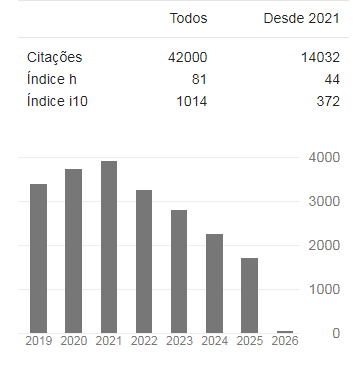Analysis of the quality of life of patients with advanced heart failure candidates or not for heart transplantation
DOI:
https://doi.org/10.5935/1415-2762.20200031Keywords:
Heart Failure, Heart Disease, Quality of Life, Heart TransplantationAbstract
Introduction: heart Failure (HF) is a serious health problem. Patients with an advanced stage of HF present, besides low life expectancy, a change in the Quality of Life (QoL) level. Objective: to analyze the QoL level of advanced HF patients, candidates or not for Heart Transplantation (HT). Method: a cross-sectional study carried out in a Brazilian university hospital, in which patients were submitted to QoL evaluation by the Minnesota Living With Heart Failure Questionnaire (MLHFQ). Results: 76 patients participated in the study. The main etiology of HF was chagasic (25 patients). The most frequent functional classes were NYHA II (26 patients) and III (33 patients). Patients under evaluation for HT and those in the queue for HT did not show a statistically significant difference in the evaluation of the QoL level. The score of the patients according to the dimensions assessed in the MLHFQ were the following: physical dimension with a median of 28.5; emotional, 13; other questions, 21; and, in the total score, 61. The final model in the multivariate analysis showed that QoL is associated with variables such as HF functional class, number of using medications, number of comorbidities and household occupation. Discussion and Conclusion: HF is a serious disease that negatively impacts survival and QoL. In this study, the patients' QoL level was associated with the HF functional class - NYHA, to the number of using medications and to the household occupation. Actions that may stimulate and favor adherence to optimal treatment should be encouraged.
Downloads
References
Tan LB, Williams SG, Tan DK, Cohen-Solal A. So many definitions of heart failure: are they all universally valid? A critical appraisal. Expert Rev Cardiovasc Ther. 2010[citado em 2019 ago. 21];8(2):217-28. Disponível em: https://doi.org/10.1586/erc.09.187
Ministério da Saúde (BR). Sistema de Informações Hospitalares do SUS (SIH/ SUS). Brasília: MS; 2014[citado em 2019 maio 31]. Disponível em: http://sihd.datasus.gov.br/remessa/remessa.php
Ministério da Saúde (BR). Datasus - Mortalidade. Brasília: MS; 2016[citado em 2019 maio 31]. Disponível em: http://tabnet.datasus.gov.br/cgi/tabcgi.exe?sim/cnv/obt10uf.def
Bacal F, Marcondes-Braga FG, Rohde LEP, Xavier Júnior JL, Brito FS, Moura LAZ, et al. 3ª Diretriz Brasileira de Transplante Cardíaco. Arq Bras Cardiol. 2018[citado em 2019 maio 31];111(2):230-89. Disponível em: http://www.scielo.br/pdf/abc/v111n2/0066-782X-abc-111-02-0230.pdf
Rohde LEP, Montera MW, Bocchi EA, Clausell NO, Albuquerque DCA, Rassi S, et al. Diretriz Brasileira de Insuficiência Cardíaca Crônica e Aguda. Arq Bras Cardiol. 2018[citado em 2019 out. 19];111(3):436-539. Disponível em: http://publicacoes.cardiol.br/portal/abc/portugues/2018/v11103/pdf/11103021.pdf
Ponikowski P, Voors AA, Anker SD, Bueno H, Cleland JGF, Coats AJS, et al. 2016 ESC Guidelines for the Diagnosis and Treatment of Acute and Chronic Heart Failure. Rev Esp Cardiol (Engl Ed). 2016[citado em 2019 out. 19];69(12):1167. Disponível em: https://doi.org/10.1016/j.rec.2016.11.005
Green CP, Porter CB, Bresnahan DR, Spertus JA. Development and evaluation of the Kansas City Cardiomyopathy Questionnaire: a new health status measure for heart failure. J Am Coll Cardiol. 2000[citado em 2019 dez. 15];35(5):1245-55. Disponível em: https://doi.org/10.1016/s0735-1097(00)00531-3
Carvalho VO, Guimarães GV, Carrara D, Bacal F, Bocchi EA. Validation of the Portuguese version of the Minnesota Living with Heart Failure Questionnaire. Arq Bras Cardiol. 2009[citado em 2019 dez. 12];93(1):39-44. Disponível em: http://www.scielo.br/pdf/abc/v93n1/en_08.pdf
Becker M, Erdmann N, Stegemann E, Benke D, Schauerte PN, Schaefer WM, et al. Survival and quality of life in patients with cardiac resynchronization therapy for severe heart failure and in heart transplant recipients within a contemporary heart failure management program. J Heart Lung Transplant. 2008[citado em 2019 dez. 4];27(7):746-52. Disponível em: https://doi.org/10.1016/j.healun.2008.03.024
Chen HM, Clark AP, Tsai LM, Lin CC. Self-reported health-related quality of life and sleep disturbances in Taiwanese people with heart failure. J Cardiovasc Nurs. 2010[citado em 2019 dez. 4];25(6):503-13. Disponível em: https://doi.org/10.1097/JCN.0b013e3181e15c37
Huang TY, Moser DK, Hwang SL, Lennie TA, Chung M, Heo S. Comparison of health-related quality of life between American and Taiwanese heart failure patients. J Transcult Nurs. 2010[citado em 2019 dez. 21];21(3):212-9. Disponível em: https://doi.org/10.1177/1043659609358779
Wang TC, Huang JL, Ho WC, Chiou AF. Effects of a supportive educational nursing care programme on fatigue and quality of life in patients with heart failure: a randomised controlled trial. Eur J Cardiovasc Nurs. 2016[citado em 2019 dez. 4];15(2):157-67. Disponível em: https://doi.org/10.1177/1474515115618567
Savarese G, Lund LH. Global Public Health Burden of Heart Failure. Card Fail Rev. 2017[citado em 2019 nov. 14];3(1):7-11. Disponível em: https://doi.org/10.15420/cfr.2016:25:2
Long EF, Swain GW, Mangi AA. Comparative survival and cost-effectiveness of advanced therapies for end-stage heart failure. Circ Heart Fail. 2014[citado em 2019 dez. 4];7(3):470-8. Disponível em: https://doi.org/10.1161/CIRCHEARTFAILURE.113.000807
Maciver J, Ross HJ. Quality of life and left ventricular assist device support. Circulation. 2012[citado em 2019 dez. 4];126(7):866-74. Disponível em: https://doi.org/10.1161/CIRCULATIONAHA.111.040279
Grady KL, Sherri W, Naftel DC, Myers S, Gelijins A, Moskowitz A, et al. Age and gender differences and factors related to change in health-related quality of life from before to 6 months after left ventricular assist device implantation: findings from interagency registry for mechanically assisted circulatory support. J Heart Lung Transplant. 2016[citado em 2019 dez. 4];35(6):777-88. Disponível em: https://doi.org/10.1016/j.healun.2016.01.1222
Emin A, Rogers CA, Banner NR, Steering Group UKCTA. Quality of life of advanced chronic heart failure: medical care, mechanical circulatory support and transplantation. Eur J Cardiothorac Surg. 2016[citado em 2019 dez. 4];50(2):269-73. Disponível em: https://doi.org/10.1093/ejcts/ezw054
The World Health Organization Quality of Life assessment (WHOQOL): position paper from the World Health Organization. Soc Sci Med. 1995[citado em 2019 dez. 4];41(10):1403-9. Disponível em: https://doi.org/10.1016/0277-9536(95)00112-k
Bunyamin V, Spaderna H, Weidner G. Health behaviors contribute to quality of life in patients with advanced heart failure independent of psychological and medical patient characteristics. Qual Life Res. 2013[citado em 2019 dez. 4];22(7):1603-11. Disponível em: https://doi.org/10.1007/s11136-012-0312-6
Santos JJ, Plewka JE, Brofman PR. Quality of life and clinical indicators in heart failure: a multivariate analysis. Arq Bras Cardiol. 2009[citado em 2019 dez. 4];93(2):159-66. Disponível em: https://doi.org/10.1590/s0066-782x2009000800015
Lewis EF, Johnson PA, Johnson W, Collins C, Griffin L, Stevenson LW. Preferences for quality of life or survival expressed by patients with heart failure. J Heart Lung Transplant. 2001[citado em 2019 dez. 4];20(9):1016-24. Disponível em: https://doi.org/10.1016/s1053-2498(01)00298-4
Karapolat H, Eyigor S, Zoghi M, Nalbantgil S, Yagdi T, Durmaz B, et al. Health related quality of life in patients awaiting heart transplantation. Tohoku J Exp Med. 2008[citado em 2019 dez. 4];214(1):17-25. Disponível em: https://doi.org/10.1620/tjem.214.17
Behlouli H, Feldman DE, Ducharme A, Frenette M, Giannetti N, Grondin F, et al. Identifying relative cut-off scores with neural networks for interpretation of the Minnesota Living with Heart Failure questionnaire. Conf Proc IEEE Eng Med Biol Soc. 2009[citado em 2019 dez. 4];2009:6242-6. Disponível em: https://doi.org/10.1109/IEMBS.2009.5334659
Hsu TW, Chang HC, Huang CH, Chou MC, Yu YT, Lin LY. Identifying cutoff scores for interpretation of the Heart Failure Impact Questionnaire. Nurs Open. 2018[citado em 2019 dez. 4];5(4):575-82. Disponível em: https://dx.doi.org/10.1002%2Fnop2.168
Bocchi EA, Cruz F, Guimarães G, Pinho Moreira LF, Issa VS, Ayub Ferreira SM, et al. Long-term prospective, randomized, controlled study using repetitive education at six-month intervals and monitoring for adherence in heart failure outpatients: the REMADHE trial. Circ Heart Fail. 2008[citado em 2019 dez. 4];1(2):115-24. Disponível em: https://doi.org/10.1161/CIRCHEARTFAILURE.107.744870
Published
Issue
Section
License
Copyright (c) 2020 Reme: Revista Mineira de Enfermagem

This work is licensed under a Creative Commons Attribution 4.0 International License.





































